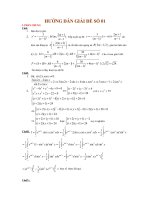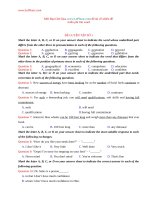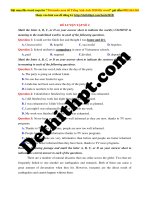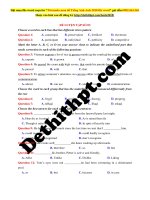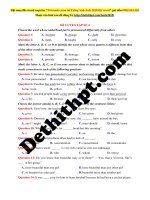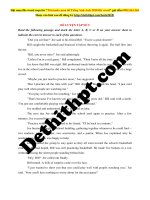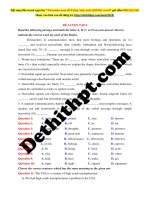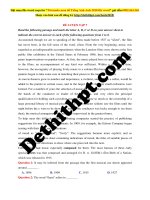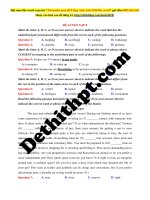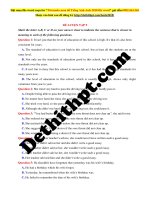- Trang chủ >>
- THPT Quốc Gia >>
- Ngoại Ngữ
De luyen co nguyen phuong hoc24h
Bạn đang xem bản rút gọn của tài liệu. Xem và tải ngay bản đầy đủ của tài liệu tại đây (114.53 KB, 17 trang )
www.LePhuoc.com
Mời Bạn Ghé Qua www.LePhuoc.com để tải về nhiều đề
miễn phí file word
ĐỀ LUYỆN TẬP SỐ 1
Mark the letter A, B, C, or D on your answer sheet to indicate the word whose underlined part
differs from the other three in pronunciation in each of the following questions.
Question 1:
A. production
B. propaganda
C. promotion
D. proceed
Question 2:
A. express
B. exciting
C. expensive
D. exhibition
Mark the letter A, B, C, or D on your answer sheet to indicate the word that differs from the
other three in the position of primary stress in each of the following questions.
Question 3:
A. geographical B. economics
C. compulsory
D. education
Question 4:
A. comfortable
B. excellent
C. communicate D. confident
Mark the letter A, B,C or D on your answer sheet to indicate the underlined part that needs
correction in each of the following questions
Question 5: New sources of energy have been looking for as the number of fossil fuels continues to
decrease.
A. sources of energy
B. been looking
C. number
D. continues
Question 6: For such a demanding job, you will need qualifications, soft skills and having full
commitment.
A. such
B. will need
C. qualifications
D.having full commitment
Question 7: Antarctic blue whales can be 100 foot long and weigh more than any dinosaur that ever
lived.
A. can be
B. 100 foot long
C. more than
D. any dinosaur
Mark the letter A, B, C, or D on your answer sheet to indicate the most suitable response to each
of the following exchanges.
Question 8: “How do you like your steak done?” - “_______.”
A. I don’t like it
B. Very little
C. Well done
D. Very much
Question 9: "Oops! I’m sorry for stepping on your foot" – “______.”
A. Never mind
B. You don't mind
C. You're welcome
D. That's fine
Mark the letter A, B, C, or D on your answer sheet to indicate the correct answer in each of the
following question.
Question 10: Dr. Sales is a person______.
A. in that I don’t have much confidence
B. whom I don’t have much confidence in Him.
www.LePhuoc.com
C. in whom I don’t have much confidence
D. I don’t have much confidence
Question 11: A quick look would reveal that France has twice______computers.
A. more televisions than
B. many as televisions as
C. as many televisions as
D. as many as televisions
Question 12: The instructor blew his whistle and______.
A. off the runners were running
B. off ran the runners
C. off were running the runners
D. the runners runs off
Question 13: People have used coal and oil to______electricity for a long time.
A. bred
B. raise
C. cultivate
D. generate
Question 14: In the early years of the 20th century, several rebellions______in the northern parts of
the country.
A. turned out
B. rose up
C. broke out
D. came up
Question 15: The festival has many attractions. It will include contemporary orchestra music and an
opera.
____ , there will be poetry readings and theatrical presentations.
A. Otherwise
B. Furthermore
C. Nevertheless
D. On the other hand
Question 16: When he started that company, he really went______. It might have been a disaster.
A. out on the limb
B. on and off
C. over the odds
D. once too often
Question 17: We regret to tell you that the materials you ordered are______.
A. out of stock
B. out of practice
C. out of reach
D. out of work
C. marrying
D.marriageable
Question 18: My sister is a woman of______age.
A. marriage
B. married
Question 19: The fire______to have started in the furnace under the house.
A. is believed
B. that is believed
C. they believed
D. that they believe
Question 20: This is the latest news from earthquake site. Two- thirds of the city______in a fire.
A. has been destroyed
B. have been destroyed
C. were destroyed
D. was destroyed
Question 21: There are many______in our library.
A. interesting American old history books
interesting old American history books
B. old American interesting history books.
C.
D. American interesting old history books
Mark the letter A, B, C, or D on your answer sheet to indicate the word CLOSEST in meaning to
the under lined word in each of the following questions
www.LePhuoc.com
Question 22: She was brought up in a well-off family. She can’t understand the problems we are
facing.
A. poor
B. broke
C. wealthy
D. kind
Question 23: The most important thing is to keep yourself occupied.
A. relaxed
B. comfortable
C. possessive
D. busy
Mark letter A, B, C, or D on your answer sheet to indicate the word or phrase that is OPPOSITE
in meaning to the underlined word(s) in each of the following questions.
Question 24: There has been insufficient rainfall over the past two years, and fanners are having
trouble.
A. abundant
B. adequate
C. unsatisfactory
D. dominant
Question 25: We strongly believe that he's innocent of the crime. We do not think that he did it.
A. crimeless
B. skillful
C. clean
D. guilty
Mark the letter A, B, C, or D on your answer sheet to indicate the sentence that is CLOSEST in
meaning to the sentence given in each of the following question.
Question 26: Only with careful environmental planning can we protect the world in which we live.
A. Careful environmental planning protects the world we live in.
B. Planning the environment carefully, we can protect the world in which we live.
C. Protecting the world we live in, we plan the environment carefully.
D. We can protect the world we live in only with careful environmental planning.
Question 27: You should take regular exercises instead of sitting in front of the television all day.
A. Taking regular exercises is better than sitting in front of the television all day.
B. Sitting in front of the television all day helps you take regular exercises.
C. Sitting in front of the television all day and taking exercises are advisable.
D. Don’t take regular exercises, just sit in front of the television all day.
Question 28: It was not until after I got home that I realized I had not set the burglar alarm in the
office.
A. On the way home, I suddenly realized that I had forgotten to turn on the burglar alarm in the
office.
B. Fortunately, I realized that I hadn't set the burglar alarm just before I left for home; otherwise,
I would have had to travel all the way back to the office.
C. I didn’t turn the burglar alarm on before I left the office, but I only became aware of this after
I'd arrived
home.
D. I wish I had realized before I arrived home that I hadn't turned on the burglar alarm in the
www.LePhuoc.com
office, then it would have been easier to go and set it.
Mark the letter A, B, C, or D on your answer sheet to indicate the sentence that best combines
each pair of sentences in the following questions.
Question 29: He did not remember the meeting. He went out for a coffee with his friends then.
A. Not remember the meeting, he went out for a coffee with his friends.
B. Not to remember the meeting, he went out for a coffee with his friends.
C. Not remembered the meeting, he went out for a coffee with his friends.
D. Not remembering the meeting, he went out for a coffee with his friends.
Question 30: They left their home early. They didn’t want to miss the first train.
A. They left their home early so as to not miss the first train.
B. They left their home early for fear that they wouldn’t miss the first train.
C. They left their home early so as not to miss the first train.
D. They left their home early in order that not to miss the first train.
Read the following passage and mark the letter A, B, C, or D on your answer sheet to choose the
word or phrase that bestfits each ofthe numbered blanks from 31 to 35
Left-handers are the odd ones out. Sure, lefties (31) ______up about 10 percent of the
population - but, frankly, it seems like society has forgotten about them. Just consider all of the
right-handed gadgets, awkwardly designed desks, and cooking tools that fit comfortably only in
your right hand. What (32) ______someone to become a lefthand? Scientists aren’t exactly sure, but
research points to a complex (33) ______between genes and environment While no exact set of
“leftie genes” have been discovered, people who dominantly use their left hands do have more lefthanded family members. And researchers have found different brain wirings in righties vs. lefties.
But no matter (34) ______it is that drives someone to use their antipodal paw, science has also
uncovered a particular set of personality traits that left-handed people tend to have. So for all of you
lefties, leftie-loving righties, and ambidextrous folks out there - it’s time to brush up on your lefthanded knowledge and help (35) ______an end to leftie discrimination once and for all.
Question 31:
A. consist
B. account
Question 32:
A. causes
B. makes
Question 33:
A. collaborate
B. collaboration
Question 34:
A. which
B. who
Question 35:
A. put
B. bring
Read the following passage and mark the letter A, B,
C. hold
D. make
C. gets
D. does
C. collaborating D. collaborated
C. what
D. that
C. make
D. take
C, or D on your answer sheet to indicate
the correct answer to each of the questions from 36 to 42.
Successful students often do the followings while studying. First, they have an overview
before reading. Next, they look for important information and pay greater attention to it (which
www.LePhuoc.com
often needs jumping forward or backward to process information). They also relate important
points to one another. Also, they activate and use their prior knowledge. When they realize that their
understanding is not good, they do not wait to change strategies. Last, they can monitor
understanding and take action to correct or “fix up” mistakes in comprehension.
Conversely, students with low academic achievement often demonstrate ineffective study
skills. They tend to assume a passive role, in learning and rely on others (e.g., teachers, parents) to
monitor their studying, for example, low-achieving students often do not monitor their
understanding of content; they may not be aware of the purpose of studying; and they show little
evidence of looking back, or employing “fix-up” strategies to fix understanding problems. Students
who struggle with learning new information seem to be unaware that they must extent effort beyond
simply reading the content to understand and remember it. Children with learning disabilities do not
plan and judge the quality of their studying. Their studying may be disorganized. Students with
learning problems face challenges with personal organization as well. They often have difficulty
keeping track of materials and assignments, following directions, and completing work on time.
Unlike good studiers who employ a variety of study skills in a flexible yet purposeful manner, lowachieving students use a restricted range of study skills. They cannot explain why good study
strategies are important for learning; and they tend to use the same, often ineffective study approach
for all learning tasks, ignoring task content, structure or difficulty.
(Source: Adapted from Study Skills: Managing Your Learning — NUI Galway)
Question 36: What is the topic of the passage?
A. Successful and low-academic achieving students
B. Successful learners and their learning strategies
C. Study skills for high school students
D. Effective and ineffective ways of learning
Question 37: The word “prior” in the first paragraph is closest meaning to ______?
A. important
B. earlier
C. forward
D. good
Question 38: According to the passage, what can be learnt about passive students?
A. They depend on other people to organize their learning
B. They are slow in their studying
C. They monitor their understanding
D. They know the purpose of studying
Question 39: Which of the followings is NOT an evidence of monitoring studying?
A. Being aware of the purpose of studying
B. Monitoring their understanding of content
www.LePhuoc.com
C. Fixing up mistakes in understanding
D. Looking at their backs
Question 40: According to the passage, to learn new information, low-achieving students do
NOT______.
A. just understand it
B. relate it to what they have known
C. simply remember it
D. read it
Question 41: In compared with low-achieving students, successful students use______.
A. aimless study techniques
B. various study skills
C. restricted strategies
D. inflexible study ways
Question 42: The underlined pronoun “They” in the last sentence refers to______.
A. study strategies
B. study skills
C. low-achieving students
D. good studiers
Read the following passage and mark the letter A, B, c, or D on your answer sheet to indicate the
correct answer to each of the questions from 43 to 50
Pollution emitted in industrial areas represents a threat to human health and the surrounding
natural resources. We have a tendency to believe that the production processes are the only source
of environmental damage, and often forget about the possible long-term effects of harmful
production practices. We may think that the closure of these huge industrial areas would improve
the quality of the environment. Unfortunately, this ignores the threat of the remaining waste, which
is abandoned and poorly stored. It represents an even bigger danger because it stands neglected as it
degrades and leaks into the earth without any control at all.
Changes in the water chemistry due to surface water contamination can affect all levels of
an ecosystem. It can affect the health of lower food chain organisms and, consequently, the
availability of food up through the food chain. It can damage the health of wetlands and damage
their ability to support healthy ecosystems, control flooding, and filter pollutants from storm water
runoff. The health of animals and humans are affected when they drink or bathe in contaminated
water. In addition water-based organisms, like fish and shellfish, can pile up and concentrate
contaminants in their bodies. When other animals or humans eat these organisms, they receive a
much higher dose of contaminant than they would have if they had been directly exposed to the
original contamination.
Contaminated groundwater can badly affect animals, plants and humans if it is removed
from the ground by manmade or natural processes. Depending on the study of rocks of the area,
groundwater may rise to the surface through springs or seeps, flow sideways into nearby rivers,
streams, or ponds, or sink deeper into the earth. In many parts of fhe world, groundwater is pumped
www.LePhuoc.com
out of the ground to be used for drinking, bathing, other household uses, agriculture, and industry.
Contaminants in the soil can harm plants when they take up the contamination through their
roots. Eating, breathing in, or touching contaminated soil, as well as eating plants or animals that
have piled up soil contaminants can badly affect the health of humans and animals.
Air pollution can cause breathing-related problems and other bad health effects as
contaminants are absorbed from the lungs into other parts of the body. Certain air contaminants can
also harm animals and humans when they contact the skin. Plants rely on breathing for their growth
and can also be affected by exposure to contaminants moved in the air.
(Source: Adapted from />Question 43: What is the topic of the passage?
A. Sources of environmental damage
B. The pollution from the city
C. Bad effects of industrial waste
D. The quality of the environment
Question 44: According to the passage, the industry is likely to be thought as______.
A. a danger to the environment
B. the only source of pollution
C. the utmost harmful activity
D. a threat to human health
Question 45: The word “it” in the first paragraph refers to______.
A. the remaining waste
B. a danger
C. the environment
D. the threat of the remaining waste
Question 46: Which of the followings affect an ecosystem as the whole?
A. Surface water contamination
B. Soil contamination
C. Groundwater contamination
D. Air contamination
Question 47: According to the passage, which of the followings supports healthy ecosystems?
A. Lower food chain organisms
B. Animals
C. Water-based organisms
D. Wetlands
Question 48: Which of the followings is NOT badly affected by contaminated groundwater?
A. Human
B. Plants
C. Rocks
D. Animals
Question 49: Which of the followings is the flow of water from the ground to the surface?
A. Streams
B. Ponds
C. Rivers
D. Springs
Question 50: Which of the followings has the closest meaning to the word “absorbed” in the last
paragraph?
A. Consumed
B. Taken in
C. Swallowed
ĐÁP ÁN
D. Piled up
www.LePhuoc.com
1-B
11-C
21-C
31-D
41-B
2-D
12-B
22-C
32-A
42-C
3-C
13-D
23-D
33-B
43-C
4-C
14-C
24-A
34-C
44-B
5-B
15-B
25-D
35-A
45-A
6-D
16-D
26-D
36-D
46-A
7-B
17-A
27-A
37-B
47-D
Question 1: Đáp án B
production /prəˈdʌkʃn/
propaganda /prɒpə'gændə/
promotion /prə'məʊt∫n/
proceed /prəˈsiːd/
Phần gạch chân của propaganda phát âm là /prɒ/ còn lại là /prə/
=> đáp án propaganda
Question 2: Đáp án D
express /ɪkˈspres/
exciting /ɪkˈsaɪtɪŋ/
expensive /ɪkˈspensɪv/
exhibition /ˌeksɪˈbɪʃn/
Phần gạch chân exhibition phát âm là /eks/ còn lại là /ɪks/
=> đáp án exhibition
Question 3: Đáp án C
geographical /dʒiə'græfikl/
economics /,i:kə'nɒmiks/
compulsory /kəm'pʌlsəri/
education /,edjʊ'kei∫n/
compulsory trọng âm rơi vào âm tiết thứ 2 còn lại là thứ 3
=> đáp án compulsory
Question 4: Đáp án C
comfortable /'kʌmftəbl/
excellent /'eksələnt/
communicate /kə'mju:nikeit/
confident /'kɒnfidənt/
communicate trọng âm rơi vào âm tiết thứ 2 còn lại là thứ nhất
=> đáp án communicate
Question 5: Đáp án B
been looking => been looked
8-C
18-D
28-C
38-A
48-C
9-A
19-A
29-D
39-D
49-D
10-C
20-A
30-C
40-B
50-B
www.LePhuoc.com
Ở đây chủ ngữ là vật nên ta phải sử dụng dạng bị động.
=> đáp án B
Tạm dịch: Các nguồn năng lượng mới đã được tìm kiếm vì số lượng nhiên liệu hoá thạch tiếp tục
giảm.
Question 6: Đáp án D
having full commitment => full commitment
Ở đây ta chỉ cần danh từ để phù hợp về ngữ pháp, vì phía trước cũng sử dụng các danh từ. (Hoặc có
thể sửa thành “have full commitment” khi đó động từ “have” và “need” cùng là động từ trong câu)
=> đáp án D
Tạm dịch: Đối với công việc đòi hỏi như vậy, bạn sẽ cần trình độ, kỹ năng mềm và tận tuỵ tuyệt
đối.
Question 7: Đáp án B
100 foot long => 100 feet long
foot là dùng cho số ít, số nhiều chuyển thành feet. foot, feet ở đây là đơn vị đo chiều dài Anh bằng
0,3048 m.
=> đáp án B
Tạm dịch: Cá voi xanh Nam Cực có thể dài 100 feet và nặng hơn bất kỳ loài khủng long nào đã
từng sống.
Question 8: Đáp án C
“Ngài muốn bít tết chín như thế nào?”
Tôi không thích nó.
Rất ít.
Chín kỹ.
Rất nhiều.
=> đáp án Well done
Question 9: Đáp án A
“Ôi! Tôi xin lỗi đã giẫm lên chân bạn.”
Các đáp án:
Không sao.
Bạn không để tâm.
Không có gì (dùng để đáp lại lời cám ơn.)
Nó ổn.
=> đáp án Never mind
Question 10: Đáp án C
Ở đây ta dùng mệnh đề quan hệ “whom” để thay thế cho danh từ chỉ người đóng vai trò là tân ngữ
trong câu. Đáp án “whom I don’t have much confidence in him” loại vì thừa từ “him”
=> đáp án : in whom I don’t have much confidence
Tạm dịch: Bác sĩ Sales là người tôi không tin tưởng cho lắm.
Question 11: Đáp án C
www.LePhuoc.com
Cấu trúc so sánh gấp số lần: once/twice/three times…. + as… as +…
=> đáp án: as many televisions as
Tạm dịch: Nhìn qua có thể thấy rằng Pháp có số lượng tivi gấp 2 lần máy tính.
Question 12: Đáp án B
Đây thuộc cấu trúc đảo ngữ với giới từ đầu mệnh đề hoặc câu. Khi giới từ đứng đầu câu thì khác so
với các loại đảo ngữ khác đó là sẽ đảo nguyên cả động từ của chủ ngữ đó
Tuy nhiên, nếu chủ ngữ của câu thuộc 1 trong 7 đại từ sau: she, he, we, they, I, it, you thì chúng ta
không đảo động từ lên mặc dù có giới từ đầu câu
=> đáp án : off ran the runners
Tạm dịch: Trọng tài thổi còi và các vận động viên chạy.
Question 13: Đáp án D
bred (quá khứ của breed): sinh ra, gây ra, mang lại
raise: nâng lên, đưa lên
cultivate: canh tác, trau dồi, tu dưỡng
generate: tạo ra, phát ra
=> đáp án : generate
Tạm dịch: Người ta đã sử dụng than và dầu để tạo ra điện trong một thời gian dài.
Question 14: Đáp án C
turn out: diễn ra, hoá ra
rise up: tăng lên
break out: bùng ra, nổ ra
come up: nhú lên, mọc, nảy sinh
=> đáp án: broke out
Tạm dịch: Trong những năm đầu của thế kỷ 20, một số cuộc nổi dậy nổ ra ở các vùng phía bắc của
đất nước.
Question 15: Đáp án B
Otherwise: mặt khác, nếu không
Furthermore: ngoài ra, thêm vào đó
Nevertheless: tuy nhiên, dù vậy
On the other hand: mặt khác
=> đáp án Furthermore
Tạm dịch: Lễ hội có nhiều điểm tham quan. Nó sẽ gồm có dàn nhạc đương đại và một vở opera.
Hơn nữa, sẽ có những bài đọc thơ và những bài diễn thuyết sân khấu.
Question 16: Đáp án D
www.LePhuoc.com
out on the limb: rơi vào thế kẹt
on and off: chốc chốc, chập chờn, thỉnh thoảng
over the odds : cần thiết, nhiều hơn mong đợi
once too often: hơn một lần được vô sự
=> đáp án once too often
Tạm dịch: Khi mới bắt đầu công ty đó, anh ta thực sự được vô sự hơn một lần. Nó đã có thể là một
thảm hoạ rồi.
Question 17: Đáp án A
out of stock: hết hàng
out of practice: không thể thực thi
out of reach: ngoài tầm với
out of work: thất nghiệp
=> đáp án out of stock
Question 18: Đáp án D
marriageable age: tuổi kết hôn, tuổi có thể kết hôn
=> đáp án marriageable
Tạm dịch: Chị tôi là người phụ nữ đến tuổi kết hôn.
Question 19: Đáp án A
Nếu dùng đáp án khác thì tất cả phía sau chỉ là bổ sung ý nghĩa cho chủ ngữ “the fire”, khi đó trong
câu thiếu mất vị ngữ.
=> đáp án is believed
Tạm dịch: Ngọn lửa được cho là bắt đầu từ cái lò ở dưới nhà.
Question 20: Đáp án A
Ở đây ta dùng thì hiện tại hoàn thành, diễn tả 1 hành động xảy ra trong quá khứ và để lại kết quả ở
hiện tại.
Với những chủ ngữ chỉ phân số, phần trăm -> ta dựa vào danh từ sau “of” để chia động từ.
=> đáp án has been destroyed
Tạm dịch: Đây là tin tức mới nhất từ nơi động đất. Hai phần ba thành phố đã bị phá hủy trong lửa.
Question 21: Đáp án C
Vị trí của tính từ khi đứng trước danh từ:
Opinion – nhận định (interesting: thú vị) + Age – tuổi tác (old: cũ) + Origin – xuất xứ (American:
Mỹ) + N
=> đáp án : interesting old American history books
Tạm dịch: Có rất nhiều cuốn sách lịch sử nước Mỹ cũ rất thú vị trong thư viện của chúng tôi.
www.LePhuoc.com
Question 22: Đáp án C
well-off: giàu có
poor: nghèo
broke: cháy túi, hết tiền
wealthy: giàu có
kind: tốt bụng
=> well-off = wealthy
=> đáp án wealthy
Tạm dịch: Cô được nuôi lớn trong một gia đình khá giả. Cô ấy không thể hiểu được những vấn đề
mà chúng ta đang phải đối mặt.
Question 23: Đáp án D
occupied: bận rộn
relaxed: không căng thẳng; ung dung
comfortable: thoải mái
possessive : chiếm hữu
busy: bận rộn
=> occupied = busy
=> đáp án busy
Tạm dịch: Điều quan trọng nhất là để giữ cho bản thân luôn bận rộn.
Question 24: Đáp án A
insufficient: không đủ, thiếu
abundant: nhiều, thừa thãi
adequate: đủ, thỏa đáng, thích đáng
unsatisfactory: không làm thỏa mãn, không làm vừa ý
dominant: át, trội hơn
=> insufficient >< abundant
=> đáp án abundant
Tạm dịch: Trong vòng hai năm trở lại đây không đủ mưa, và các máy quạt thóc đều gặp rắc rối.
Question 25: Đáp án D
innocent: vô tội
không có từ crimeless
skillful: lành nghề
clean: trong sạch
guilty: có tội
www.LePhuoc.com
=> innocent >< guilty
=> đáp án guilty
Tạm dịch: Chúng tôi tin tưởng rằng anh ấy vô tội. Chúng tôi không nghĩ rằng anh ấy đã thực hiện
điều đó.
Question 26: Đáp án D
Tạm dịch: Chỉ với việc hoạch định môi trường cẩn thận chúng ta mới có thể bảo vệ được thế giới
mà chúng ta đang sống.
Các đáp án
Hoạch định môi trường cẩn thận bảo vệ thế giới chúng ta đang sống.
Hoạch định môi trường một cách cẩn thận, chúng ta có thể bảo vệ thế giới mà chúng ta đang sống.
Bảo vệ thế giới chúng ta đang sống, chúng ta hoạch định môi trường một cách cẩn thận.
Chúng ta chỉ có thể bảo vệ thế giới chúng ta đang sống duy nhất bằng việc hoạch định môi trường
cẩn thận.
=> đáp án : We can protect the world we live in only with careful environmental planning.
Question 27: Đáp án A
Tạm dịch: Bạn nên tập thể dục thường xuyên thay vì ngồi trước tivi hàng ngày.
Các đáp án:
Tập thể dục đều đặn tốt hơn ngồi trước tivi hàng ngày.
Ngồi trước tivi cả ngày giúp bạn tập thể dục thường xuyên.
Ngồi trước tivi hàng ngày và tập thể dục được khuyến khích.
Không tập thể dục thường xuyên, chỉ ngồi trước tivi suốt ngày.
=> đáp án : Taking regular exercises is better than sitting in front of the television all day.
Question 28: Đáp án C
Tạm dịch: Mãi đến sau khi tôi về đến nhà tôi mới nhận ra rằng tôi đã không đặt báo động chống
trộm trong văn phòng.
Các đáp án:
Trên đường về nhà, tôi đột nhiên nhận ra rằng tôi đã quên bật báo động chống trộm trong văn
phòng.
May mắn thay, tôi nhận ra rằng tôi chưa đặt báo động chống trộm trước khi tôi về nhà; nếu không,
tôi đã phải quay trở lại văn phòng.
Tôi đã không bật báo động chống trộm trước khi rời văn phòng, nhưng tôi chỉ nhận ra điều này sau
khi tôi về đến nhà.
Tôi ước gì tôi đã nhận ra trước khi tôi về đến nhà rằng tôi đã không bật báo động chống trộm trong
văn phòng, sau đó nó sẽ dễ dàng hơn để thiết lập nó.
www.LePhuoc.com
=> đáp án : I didn’t turn the burglar alarm on before I left the office, but I only became aware of
this after I'd arrived home.
Question 29: Đáp án D
Khi động từ đứng đầu câu mà không có chủ ngữ, ta dùng dạng danh động từ.
=> đáp án Not remembering the meeting, he went out for a coffee with his friends.
Tạm dịch: Không nhớ cuộc họp, anh ta đã đi cà phê với bạn bè.
Question 30: Đáp án C
Cấu trúc so as not to do sth: để không làm việc gì
=> đáp án They left their home early so as not to miss the first train.
Tạm dịch: Họ rời nhà sớm để không bị lỡ chuyến tàu đầu tiên.
Question 31: Đáp án D
To make up: tạo nên, làm nên
=> đáp án make
Question 32: Đáp án A
Cấu trúc To cause sb to do sth: khiến ai làm việc gì
=> đáp án causes
Question 33: Đáp án B
Ở đây ta cần một danh từ vì phía trước có tính từ và mạo từ “a”
=> đáp án collaboration
Question 34: Đáp án C
Trong câu này: no matter what it is: không quan trọng nó là cái gì
=> đáp án what
Question 35: Đáp án A
To put an end to: chấm dứt cái gì
=> đáp án put
Question 36: Đáp án D
Chủ đề của đoạn văn là gì?
Học sinh giỏi và học sinh kém
Những người học giỏi và các chiến lược học tập của họ
Kỹ năng học tập dành cho học sinh trung học
Cách học hiệu quả và không hiệu quả
=> đáp án : Effective and ineffective ways of learning
Question 37: Đáp án B
Từ "prior" ở đoạn đầu tiên có ý nghĩa gần nhất với ______?
quan trọng
trước đó
chuyển tiếp
tốt
www.LePhuoc.com
=> prior = earlier: trước đó
Question 38: Đáp án A
Theo đoạn văn, điều gì có thể rút ra về những học sinh thụ động?
Họ phụ thuộc vào người khác để tổ chức học tập
Họ chậm trong việc học tập
Họ theo dõi hiểu biết của mình
Họ biết mục tiêu học tập
=> đáp án : They depend on other people to organize their learning
Thông tin: They tend to assume a passive role, in learning and rely on others (e.g., teachers,
parents) to monitor their studying
Question 39: Đáp án D
Điều sau đây KHÔNG phải là bằng chứng của việc theo dõi học tập?
Nhận thức được mục đích học tập
Theo dõi sự hiểu biết của họ về bài học
Xử lý sai lầm trong hiểu biết
Nhìn vào lưng của họ
=> đáp án : Looking at their backs
Question 40: Đáp án B
Theo đoạn văn, để tìm hiểu thông tin mới, học sinh kém KHÔNG______.
chỉ hiểu nó
liên hệ nó với những gì họ đã biết
chỉ đơn giản là nhớ nó
đọc nó
=> đáp án : relate it to what they have known
Thông tin: Students who struggle with learning new information seem to be unaware that they must
extent effort beyond simply reading the content to understand and remember it.
Question 41: Đáp án B
So với các học sinh kém, học sinh giỏi sử dụng ____.
các phương pháp học tập vô nghĩa
các kỹ năng học tập khác nhau
các chiến lược hạn chế
cách học tập không linh hoạt
=> đáp án : various study skills
Question 42: Đáp án C
www.LePhuoc.com
Đại từ được gạch dưới "They" trong câu cuối cùng đề cập đến ____.
các chiến lược học tập
kỹ năng học tập
học sinh kém
người học giỏi
=> đáp án : low-achieving students
“they” được thay cho “low-achieving students”
Question 43: Đáp án C
Chủ đề của đoạn văn là gì?
Các nguồn gây tổn hại môi trường
Sự ô nhiễm từ thành phố
Ảnh hưởng xấu của chất thải công nghiệp
Chất lượng môi trường
=> đáp án : Bad effects of industrial waste
Question 44: Đáp án B
Theo đoạn văn, ngành công nghiệp có thể sẽ được nghĩ là ______.
một mối nguy hiểm cho môi trường
nguồn ô nhiễm duy nhất
hoạt động gây hại tối đa
một mối đe dọa đối với sức khoẻ con người
=> đáp án : the only source of pollution
Thông tin: We have a tendency to believe that the production processes are the only source of
environmental damage
Question 45: Đáp án A
Từ "nó" trong đoạn đầu đề cập đến ____.
chất thải hiện có
nguy hiểm
môi trường
sự đe dọa của chất thải hiện có
=> đáp án the remaining waste
Question 46: Đáp án A
vấn đề nào sau đây ảnh hưởng đến toàn bộ hệ sinh thái?
Ô nhiễm nước bề mặt
Sự ô nhiễm đất
Ô nhiễm nước ngầm
Ô nhiễm không khí
=> đáp án Surface water contamination
www.LePhuoc.com
Thông tin: Changes in the water chemistry due to surface water contamination can affect all levels
of an ecosystem.
Question 47: Đáp án D
Theo đoạn văn, cái gì hỗ trợ hệ sinh thái lành mạnh?
Các sinh vật chuỗi dưới thức ăn
Động vật
Sinh vật sống dưới nước
Đất ngập nước
=> đáp án Wetlands
Thông tin: It can damage the health of wetlands and damage their ability to support healthy
ecosystems, control flooding, and filter pollutants from storm water runoff.
Question 48: Đáp án C
Cái gì không bị ảnh hưởng xấu bởi nước ngầm bị ô nhiễm?
con người
cây cối
hòn đá động vật
=> đáp án Rocks
Question 49: Đáp án D
Cái nào là dòng chảy của nước từ mặt đất đến bề mặt?
dòng ao
sông
suối
=> đáp án Springs
Thông tin: Depending on the study of rocks of the area, groundwater may rise to the surface
through springs or seeps, flow sideways into nearby rivers, streams, or ponds, or sink deeper into
the earth.
Question 50: Đáp án B
Câu nào sau đây có ý nghĩa gần nhất với từ "hấp thụ" ở đoạn cuối?
tiêu thụ
hấp thu vào
nuốt
chất đống
=> đáp án Taken in
www.LePhuoc.com
Bạn có thể tải miễn phí nhiều đề
Bạn có thể mua nhiều đề file word có lời giải chi tiết giá rẻ
